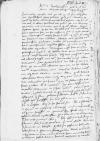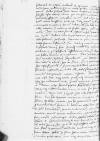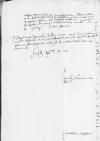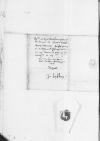Quia manum agnoscis eius, qui tibi ex animo fuit eritque filius, non excusabo huius chartae sorditiem orig. sordiciem⌈sorditiemsorditiem orig. sordiciem⌉, quia, cum orig. quum⌈cumcum orig. quum⌉ nuntiarentur orig. nunciarentur⌈nuntiarenturnuntiarentur orig. nunciarentur⌉ Gdańsk (Danzig, Dantiscum), city in northern Poland, on the Bay of Gdańsk at the mouth of the Vistula, on the Baltic, the biggest and wealthiest of the three Great Prussian Cities (Gdańsk, Thorn (Toruń), and Elbing (Elbląg)) with representation in the Council of Royal Prussia; a member of the Hanseatic League⌊GedanumGdańsk (Danzig, Dantiscum), city in northern Poland, on the Bay of Gdańsk at the mouth of the Vistula, on the Baltic, the biggest and wealthiest of the three Great Prussian Cities (Gdańsk, Thorn (Toruń), and Elbing (Elbląg)) with representation in the Council of Royal Prussia; a member of the Hanseatic League⌋ ex London (Londinium), city in England, on the Thames river⌊LondinoLondon (Londinium), city in England, on the Thames river⌋ nonnuli ex Citizens of Gdańsk ⌊concivibusCitizens of Gdańsk ⌋ tuis profecturi, alia ad manum non erat et aberant familiares mei, quibus haec cura delegata est, tantum nolo praetermittere, quin te ex animo salutem.
cf. Cornelis DE SCHEPPER to Ioannes DANTISCUS London, 1545-09-01, CIDTC IDL 2863⌊Scripsicf. Cornelis DE SCHEPPER to Ioannes DANTISCUS London, 1545-09-01, CIDTC IDL 2863⌋ superiore hieme orig. hyeme⌈hiemehieme orig. hyeme⌉ ex London (Londinium), city in England, on the Thames river⌊hoc locoLondon (Londinium), city in England, on the Thames river⌋ de rebus, quae tunc occurrebant. Summa argumenti fuit me London (Londinium), city in England, on the Thames river⌊hucLondon (Londinium), city in England, on the Thames river⌋ missum, ut fieri, si posset, principem hunc et potentissimum Henry VIII Tudor (*1491 – †1547), 1509-1547 King of England; son of Henry VII Tudor and Elizabeth of York⌊Angliae, Franciae et Hyberniae regemHenry VIII Tudor (*1491 – †1547), 1509-1547 King of England; son of Henry VII Tudor and Elizabeth of York⌋ ad pacem cum Francis I of Valois (*1494 – †1547), 1515-1547 King of France; son of Charles, Count of Angoulême, and Louise of Savoy⌊Francorum regeFrancis I of Valois (*1494 – †1547), 1515-1547 King of France; son of Charles, Count of Angoulême, and Louise of Savoy⌋ ineundam inducerem nomine Charles V of Habsburg (*1500 – †1558), ruler of the Burgundian territories (1506-1555), King of Spain as Charles I (1516-1556), King of Naples and Sicily, King of the Romans (1519-1530), Holy Roman Emperor of the German Nation (elected 1519, crowned 1530, abdicated 1556); son of Philip I the Handsome and Joanna the Mad of Castile⌊caesareae maiestatisCharles V of Habsburg (*1500 – †1558), ruler of the Burgundian territories (1506-1555), King of Spain as Charles I (1516-1556), King of Naples and Sicily, King of the Romans (1519-1530), Holy Roman Emperor of the German Nation (elected 1519, crowned 1530, abdicated 1556); son of Philip I the Handsome and Joanna the Mad of Castile⌋. Charles V of Habsburg (*1500 – †1558), ruler of the Burgundian territories (1506-1555), King of Spain as Charles I (1516-1556), King of Naples and Sicily, King of the Romans (1519-1530), Holy Roman Emperor of the German Nation (elected 1519, crowned 1530, abdicated 1556); son of Philip I the Handsome and Joanna the Mad of Castile⌊QuaeCharles V of Habsburg (*1500 – †1558), ruler of the Burgundian territories (1506-1555), King of Spain as Charles I (1516-1556), King of Naples and Sicily, King of the Romans (1519-1530), Holy Roman Emperor of the German Nation (elected 1519, crowned 1530, abdicated 1556); son of Philip I the Handsome and Joanna the Mad of Castile⌋ pro officio, quo fungitur, mallet has potentissimorum regum vires pro conservatione reipublicae servari, quam mutuo civilique bello atteri atque consumi, ob eamque rem missi fuere ab Henry VIII Tudor (*1491 – †1547), 1509-1547 King of England; son of Henry VII Tudor and Elizabeth of York
Francis I of Valois (*1494 – †1547), 1515-1547 King of France; son of Charles, Count of Angoulême, and Louise of Savoy⌊iisdem potentissimis regibusHenry VIII Tudor (*1491 – †1547), 1509-1547 King of England; son of Henry VII Tudor and Elizabeth of York
Francis I of Valois (*1494 – †1547), 1515-1547 King of France; son of Charles, Count of Angoulême, and Louise of Savoy⌋ ad caesarem Stephen Gardiner (*ca. 1497 – †1555), theologian, humanist and diplomat, doctor of both laws; 1521-1524 lecturer in the faculties of civil and canon law at Trinity Hall, 1524 secretary of cardinal Thomas Wolsey, 1525-1549, 1553-1555 master of Trinity Hall, 1526 Archdeacon of Taunton, 1528 secretary of King Henry VIII Tudor and archdeacon of Worcester, 1529 - of Norfolk, 1531 - of Leicester, 1531–1551, 1553–1555 Bishop of Winchester, 1540-1547, 1553-1555 Chancellor of Cambridge, 1553 Lord High Chancellor, 1531-1532, 1535-1538 English ambassador at the French court, 1533 royal envoy to France, to Clement VII, 1539 - to Germany, 1540-1541, 1544, 1545-1546 ambassador at the court of Emperor Charles V (CE, vol. 2, p. 74-76)
Claude d' Annebault (*1495 – †1552), 1527-1537 commander of light cavalry and Albanians in the French service; 1538–1552 Marshal of France (1547-1552 only nominally); 1541 Governor of Piedmont; 1543 - of Normandy; 1544-1552 Admiral of France; 1544 commander of the French fleet against England; 1545 ambassador of the King Francis I of France at the imperial court; 1546 chief French plenipotentiary at the peace talks between England and French at Ardres (KNECHT 1984, p. 287, 294-295, 300, 363-364, 372-376, 414, 416-417, 424; POTTER 2008, p. 46 (footnote 30), 87, 241)
François Olivier (*1497 – †1560), diplomat and statesman in the service of France; 1545-1560 Chancellor of France (DUPÈBE)
Gilbert Bayard (†1548), Baron de La Font, diplomat, secretary of finance and comptroller general of the wars to Francis I King of France (THOMAS 2007)
Thomas Thirlby (*ca. 1506 – †1570), 1540 Bishop of Westminster; 1544 Councillor of State; 1550 Bishop of Norwich; 1542, 1545-1548, 1553-1554 English ambassador to the Emperor (POTTER 2011, p. 561)
Edward Carne (*ca. 1496 – †1561), English diplomat 1538-1539 ambassador to Cleves 1541, 1544-1548 - to Mary of Hungary 1545 one of the English commissioners to the conference at Bourbourg to discuss commercial differences and claims 1555-1559 Resident Ambassador to Rome (he was recalled in 1558 when Queen Elisabeth ascended to the throne, but he remained in Rome until his death his responsibilities as an English minister had ceased by April 1559) (BELL, p. 177-178; POTTER 2011, p. 547)⌊legatiStephen Gardiner (*ca. 1497 – †1555), theologian, humanist and diplomat, doctor of both laws; 1521-1524 lecturer in the faculties of civil and canon law at Trinity Hall, 1524 secretary of cardinal Thomas Wolsey, 1525-1549, 1553-1555 master of Trinity Hall, 1526 Archdeacon of Taunton, 1528 secretary of King Henry VIII Tudor and archdeacon of Worcester, 1529 - of Norfolk, 1531 - of Leicester, 1531–1551, 1553–1555 Bishop of Winchester, 1540-1547, 1553-1555 Chancellor of Cambridge, 1553 Lord High Chancellor, 1531-1532, 1535-1538 English ambassador at the French court, 1533 royal envoy to France, to Clement VII, 1539 - to Germany, 1540-1541, 1544, 1545-1546 ambassador at the court of Emperor Charles V (CE, vol. 2, p. 74-76)
Claude d' Annebault (*1495 – †1552), 1527-1537 commander of light cavalry and Albanians in the French service; 1538–1552 Marshal of France (1547-1552 only nominally); 1541 Governor of Piedmont; 1543 - of Normandy; 1544-1552 Admiral of France; 1544 commander of the French fleet against England; 1545 ambassador of the King Francis I of France at the imperial court; 1546 chief French plenipotentiary at the peace talks between England and French at Ardres (KNECHT 1984, p. 287, 294-295, 300, 363-364, 372-376, 414, 416-417, 424; POTTER 2008, p. 46 (footnote 30), 87, 241)
François Olivier (*1497 – †1560), diplomat and statesman in the service of France; 1545-1560 Chancellor of France (DUPÈBE)
Gilbert Bayard (†1548), Baron de La Font, diplomat, secretary of finance and comptroller general of the wars to Francis I King of France (THOMAS 2007)
Thomas Thirlby (*ca. 1506 – †1570), 1540 Bishop of Westminster; 1544 Councillor of State; 1550 Bishop of Norwich; 1542, 1545-1548, 1553-1554 English ambassador to the Emperor (POTTER 2011, p. 561)
Edward Carne (*ca. 1496 – †1561), English diplomat 1538-1539 ambassador to Cleves 1541, 1544-1548 - to Mary of Hungary 1545 one of the English commissioners to the conference at Bourbourg to discuss commercial differences and claims 1555-1559 Resident Ambassador to Rome (he was recalled in 1558 when Queen Elisabeth ascended to the throne, but he remained in Rome until his death his responsibilities as an English minister had ceased by April 1559) (BELL, p. 177-178; POTTER 2011, p. 547)⌋ primae dignitatis et nominis mense Novembre praeterito, neque tamen quicquam vel de pace, vel indutiis orig. induciis⌈indutiisindutiis orig. induciis⌉ successit inter eos, immo orig. imo⌈immoimmo orig. imo⌉ acrioribus animis bellum continuarunt.[1] Iam quaternis vicibus England⌊hicEngland⌋ adfui, si non cum simili, at non multum abhorrente argumento, ut est Charles V of Habsburg (*1500 – †1558), ruler of the Burgundian territories (1506-1555), King of Spain as Charles I (1516-1556), King of Naples and Sicily, King of the Romans (1519-1530), Holy Roman Emperor of the German Nation (elected 1519, crowned 1530, abdicated 1556); son of Philip I the Handsome and Joanna the Mad of Castile⌊caesarea maiestasCharles V of Habsburg (*1500 – †1558), ruler of the Burgundian territories (1506-1555), King of Spain as Charles I (1516-1556), King of Naples and Sicily, King of the Romans (1519-1530), Holy Roman Emperor of the German Nation (elected 1519, crowned 1530, abdicated 1556); son of Philip I the Handsome and Joanna the Mad of Castile⌋ componendarum rerum reipublicae Christianae avidissima, neque tamen admodum promovi. Bellum, quod dolenter refero, paratur England
France (Gallia, Francia), the kingdom⌊utrimque terraEngland
France (Gallia, Francia), the kingdom⌋ North Sea⌊mariqueNorth Sea⌋ utrique parti luctuosum, reipublicae etiam calamitosum. Quid facias, cum orig. quum⌈cumcum orig. quum⌉ vel scelera nostra vel fatale quiddam ad id impellant? Ego periculosissimis anni temporibus sub equinoctia et solstitium hibernum orig. hybernum⌈hibernumhibernum orig. hybernum⌉ pelagus istud dimetiens magnis et laboribus, et periculis meis nihil aliud sum assecutus orig. assequutus⌈assecutusassecutus orig. assequutus⌉ quam taedium, quod certe sublevatum fuisset, si fructus aliquid exin successisset. Feci tamen, quod iniunctum mihi meaque fuit in potestate atque in hoc statu res sunt.
De te subdubitare coepi orig. cepi⌈coepicoepi orig. cepi⌉, cum orig. quum⌈cumcum orig. quum⌉ me negligentiae oblivionisque nec sine causa accusaris, quod non scripsissem, ne quominus idem fe written over ...⌈... illegible⌈...... illegible⌉ee written over ...⌉ceri written over e⌈eii written over e⌉s aliqua te valetudo adversa impedivisset. Qua sollicitudine ut me exim{i}as, si fieri potest, quantocius orig. quantocyus⌈quantociusquantocius orig. quantocyus⌉ effice.
Res Charles V of Habsburg (*1500 – †1558), ruler of the Burgundian territories (1506-1555), King of Spain as Charles I (1516-1556), King of Naples and Sicily, King of the Romans (1519-1530), Holy Roman Emperor of the German Nation (elected 1519, crowned 1530, abdicated 1556); son of Philip I the Handsome and Joanna the Mad of Castile⌊caesarisCharles V of Habsburg (*1500 – †1558), ruler of the Burgundian territories (1506-1555), King of Spain as Charles I (1516-1556), King of Naples and Sicily, King of the Romans (1519-1530), Holy Roman Emperor of the German Nation (elected 1519, crowned 1530, abdicated 1556); son of Philip I the Handsome and Joanna the Mad of Castile⌋
cf. Adagia 45 ⌊in vadocf. Adagia 45 ⌋ sunt. Germany (Germania, Niemcy)⌊GermaniaGermany (Germania, Niemcy)⌋, fieri si potest, pacabitur, sin minus, ostendet Charles V of Habsburg (*1500 – †1558), ruler of the Burgundian territories (1506-1555), King of Spain as Charles I (1516-1556), King of Naples and Sicily, King of the Romans (1519-1530), Holy Roman Emperor of the German Nation (elected 1519, crowned 1530, abdicated 1556); son of Philip I the Handsome and Joanna the Mad of Castile⌊caesarCharles V of Habsburg (*1500 – †1558), ruler of the Burgundian territories (1506-1555), King of Spain as Charles I (1516-1556), King of Naples and Sicily, King of the Romans (1519-1530), Holy Roman Emperor of the German Nation (elected 1519, crowned 1530, abdicated 1556); son of Philip I the Handsome and Joanna the Mad of Castile⌋ se suo muneri non defuisse. Qualia sint pessimorum hominum, quibus hodie summa in Germany (Germania, Niemcy)⌊GermaniaGermany (Germania, Niemcy)⌋ summa permittitur libertas, consilia, tibi mihique ignota non sunt, nimirum ut omnem statum monarchiae, rerum publicarum, politiae evertant homines apostatae et ex monachis
 UUB, H. 155, f. 114v
sceleratis et ineptis evadentes in opinionem per se posse hidden by binding⌈[e]e hidden by binding⌉ molem hanc gub written over ...⌈... illegible⌈...... illegible⌉bb written over ...⌉ernari, qui ne caulae quidem regendae sunt pares. Audio sub hos dies eorum antesignanum Martin Luther (Martinus Lutherus) (*1483 – †1546), theologian, leader and originator of the German Reformation⌊LutherumMartin Luther (Martinus Lutherus) (*1483 – †1546), theologian, leader and originator of the German Reformation⌋ solvisse iusta naturae.[2] Utinam, qui Martin Luther (Martinus Lutherus) (*1483 – †1546), theologian, leader and originator of the German Reformation⌊eumMartin Luther (Martinus Lutherus) (*1483 – †1546), theologian, leader and originator of the German Reformation⌋ sunt maledicentia improbitateque assecuti orig. assequuti⌈assecutiassecuti orig. assequuti⌉, interiissent omnes, sed cf. Ov. Ep. 16.263 adhuc tua messis in herba est ⌊adhuc talium hominum maior messis in herba estcf. Ov. Ep. 16.263 adhuc tua messis in herba est ⌋. Neque Poland (Kingdom of Poland, Polonia)⌊regnum quidem PoloniaePoland (Kingdom of Poland, Polonia)⌋, uti tempora et ingenia hominum video, ab hac labe diu manebit intactum, si modo non est infici coeptum, quod magis metuo. Iam in vere sumus, aestas orig. estas⌈aestasaestas orig. estas⌉ nihil pacati minatur.
UUB, H. 155, f. 114v
sceleratis et ineptis evadentes in opinionem per se posse hidden by binding⌈[e]e hidden by binding⌉ molem hanc gub written over ...⌈... illegible⌈...... illegible⌉bb written over ...⌉ernari, qui ne caulae quidem regendae sunt pares. Audio sub hos dies eorum antesignanum Martin Luther (Martinus Lutherus) (*1483 – †1546), theologian, leader and originator of the German Reformation⌊LutherumMartin Luther (Martinus Lutherus) (*1483 – †1546), theologian, leader and originator of the German Reformation⌋ solvisse iusta naturae.[2] Utinam, qui Martin Luther (Martinus Lutherus) (*1483 – †1546), theologian, leader and originator of the German Reformation⌊eumMartin Luther (Martinus Lutherus) (*1483 – †1546), theologian, leader and originator of the German Reformation⌋ sunt maledicentia improbitateque assecuti orig. assequuti⌈assecutiassecuti orig. assequuti⌉, interiissent omnes, sed cf. Ov. Ep. 16.263 adhuc tua messis in herba est ⌊adhuc talium hominum maior messis in herba estcf. Ov. Ep. 16.263 adhuc tua messis in herba est ⌋. Neque Poland (Kingdom of Poland, Polonia)⌊regnum quidem PoloniaePoland (Kingdom of Poland, Polonia)⌋, uti tempora et ingenia hominum video, ab hac labe diu manebit intactum, si modo non est infici coeptum, quod magis metuo. Iam in vere sumus, aestas orig. estas⌈aestasaestas orig. estas⌉ nihil pacati minatur.
Universal Council of Roman Catholic Church ⌊ConciliumUniversal Council of Roman Catholic Church ⌋ Trent (Tridentum), city in northern Italy, Trentino-Alto Adige (Südtirol)⌊TridentiTrent (Tridentum), city in northern Italy, Trentino-Alto Adige (Südtirol)⌋ ultra exspectationem orig. expectationem⌈exspectationemexspectationem orig. expectationem⌉ quorundam orig. quorumdam⌈quorundamquorundam orig. quorumdam⌉ succedit felicius orig. foelicius⌈feliciusfelicius orig. foelicius⌉. Quaestio orig. Questio⌈QuaestioQuaestio orig. Questio⌉ est, dogmatane orig. dogmata ne⌈dogmatanedogmatane orig. dogmata ne⌉ prius, an mores ecclesiasticorum reformandi sint. Utrimque magnum argumentum et praestaret utrumque fieri, quamquam mores vix reformari patientur ii, qui pessimis assueverunt, etiam si alioqui nomen habent bonorum et magnorum. Nos interim miselli hidden by binding⌈[i]i hidden by binding⌉ laici orig. layci⌈laicilaici orig. layci⌉ ex vobis praesulibus dependentes, qui deberetis incumbere
cf. Adagia 318 remis velisque ⌊velis et remiscf. Adagia 318 remis velisque ⌋, haec ut fiant, qua in parte ancoram orig. anchoram⌈ancoramancoram orig. anchoram⌉ spei nostrae fi{n}gemus? Quare orandus Deus est, ut vobis salutaria imperandi, nobis autem vobis salutaribusque vestris monitis obtemperandi mentem inspiret.
De re domestica hidden by binding⌈[a]a hidden by binding⌉ mea nihil dico neque accedit quicquam, neque decrescit Deo gratia, estque haec mediocritas mihi quovis augmento fortunae gratior, tantum mihi fructus peperit philosophia orig. phylosophia⌈philosophiaphilosophia orig. phylosophia⌉ experientiaque. Itaque neque cuiquam invideo suam, et mea sum fortuna contentus. Elisabeth Donche (Anna Isabella Donche, Isabeau) (†1549), from 1528 wife of Cornelis De Schepper, mother of Cornelis Jr and Anne, sister of Joanna Donche (AT 16/1, p. 215)⌊UxorElisabeth Donche (Anna Isabella Donche, Isabeau) (†1549), from 1528 wife of Cornelis De Schepper, mother of Cornelis Jr and Anne, sister of Joanna Donche (AT 16/1, p. 215)⌋ mea superest, quae mihi peperit Cornelis De Schepper Jr (*1532 – †1582 or 1583), son of Cornelis De Schepper (DE VOCHT 1961, 316, 403-404; DONCHE, p. 310, 346-349)⌊filiumCornelis De Schepper Jr (*1532 – †1582 or 1583), son of Cornelis De Schepper (DE VOCHT 1961, 316, 403-404; DONCHE, p. 310, 346-349)⌋ et Anne De Schepper (*1529-1532 – †1619), daughter of Cornelis De Schepper (DONCHE, p. 340-346)⌊filiamAnne De Schepper (*1529-1532 – †1619), daughter of Cornelis De Schepper (DONCHE, p. 340-346)⌋. Elisabeth Donche (Anna Isabella Donche, Isabeau) (†1549), from 1528 wife of Cornelis De Schepper, mother of Cornelis Jr and Anne, sister of Joanna Donche (AT 16/1, p. 215)⌊EiusElisabeth Donche (Anna Isabella Donche, Isabeau) (†1549), from 1528 wife of Cornelis De Schepper, mother of Cornelis Jr and Anne, sister of Joanna Donche (AT 16/1, p. 215)⌋ Catharina Laurijn (†1556), the youngest child of Elisabeth Donche and Pieter Laurijn, wife of Johann le Gros, alderman of the Brugse Vrije (Franc of Bruges) (DE VOCHT 1961, p. 316)⌊filiaCatharina Laurijn (†1556), the youngest child of Elisabeth Donche and Pieter Laurijn, wife of Johann le Gros, alderman of the Brugse Vrije (Franc of Bruges) (DE VOCHT 1961, p. 316)⌋ ex priore Pieter Laurijn first husband of Elisabeth Donche⌊maritoPieter Laurijn first husband of Elisabeth Donche⌋ iam bis peperit. Matthias Laurijn son of Elisabeth Donche and her first husband Pieter Laurijn (1489-1522), stepson of Cornelis De Schepper⌊AlterMatthias Laurijn son of Elisabeth Donche and her first husband Pieter Laurijn (1489-1522), stepson of Cornelis De Schepper⌋ filiorum ex eodem Pieter Laurijn first husband of Elisabeth Donche⌊maritoPieter Laurijn first husband of Elisabeth Donche⌋, quo de querimoniam apud te egi, quod virtutibus illius fortuna in bello non responderit, sed quod in proelio Sittardiensi[3] graviter vulneratus per mille tormenta, animum tamen confirmatum gerens liberatus fuit, mansit Constantinople (Istanbul, Constantinopolis), city and capital of the Ottoman Empire, today in western Turkey⌊ConstantinopoliConstantinople (Istanbul, Constantinopolis), city and capital of the Ottoman Empire, today in western Turkey⌋ ibidem aegrotus relictus ab oratore hidden by binding⌈[re]re hidden by binding⌉ caesareo domino Gerard Veltwijck (*ca. 1500 – †1555), 1545-1547 imperial envoy to Sultan Suleiman I. One of the well-known 16th century Orientalists; as a student of the Collegium Trilingue, he conducted research into the history of the Syrian and Aramaic biblical translations in Venetian and Roman libraries and archives; before 1540 entered the service of Emperor Charles V as a secretary to Chancellor Nicolas Perrenot de Granvelle, the Imperial Keeper of the Seal and Secretary and Ordinary of the Privy Council of the Habsburg Netherlands (SEVERI, 211-212)⌊Gherardo VeltwyckGerard Veltwijck (*ca. 1500 – †1555), 1545-1547 imperial envoy to Sultan Suleiman I. One of the well-known 16th century Orientalists; as a student of the Collegium Trilingue, he conducted research into the history of the Syrian and Aramaic biblical translations in Venetian and Roman libraries and archives; before 1540 entered the service of Emperor Charles V as a secretary to Chancellor Nicolas Perrenot de Granvelle, the Imperial Keeper of the Seal and Secretary and Ordinary of the Privy Council of the Habsburg Netherlands (SEVERI, 211-212)⌋, viro doctissimo et in agen hidden by binding⌈[n]n hidden by binding⌉dis rebus summae spei. Quid de Matthias Laurijn son of Elisabeth Donche and her first husband Pieter Laurijn (1489-1522), stepson of Cornelis De Schepper⌊eoMatthias Laurijn son of Elisabeth Donche and her first husband Pieter Laurijn (1489-1522), stepson of Cornelis De Schepper⌋ successerit, nescio, sed aveo hidden by binding⌈[eo]eo hidden by binding⌉ scire. Alteri ex privignis valetudo incolumis neque, uti spero, fortuna deerit. Habes in summa statum rerum mearum, quoad hidden by binding⌈[oad]oad hidden by binding⌉ a viro bono potest optari, nam neque obnoxius sum invidiae, et
 UUB, H. 155, f. 115r
versor extra ambitionem et paupertatem.
UUB, H. 155, f. 115r
versor extra ambitionem et paupertatem.
Dominus Deus te cum Bernhard von Höfen (Bernhard Flachsbinder) (†after 1548), Ioannes Dantiscus' brother, stayed with Dantiscus in Spain, as a member of his mission's retinue, and was used as a trusted courier to Poland at least from 1526; after 1530 Starost of Löbau
Georg von Höfen (Georg Flachsbinder, Georgius de Curiis) (†after 1550-02-07), Ioannes Dantiscus' brother; Starosta of Rössel (HARTMANN 1525-1550, No. 584, 586, 588; AGAD, MK, 77, f. 385-386v)⌊fratribusBernhard von Höfen (Bernhard Flachsbinder) (†after 1548), Ioannes Dantiscus' brother, stayed with Dantiscus in Spain, as a member of his mission's retinue, and was used as a trusted courier to Poland at least from 1526; after 1530 Starost of Löbau
Georg von Höfen (Georg Flachsbinder, Georgius de Curiis) (†after 1550-02-07), Ioannes Dantiscus' brother; Starosta of Rössel (HARTMANN 1525-1550, No. 584, 586, 588; AGAD, MK, 77, f. 385-386v)⌋
Anna von Höfen (Anna Reyneck, Anna Flachsbinder), sister of Ioannes Dantiscus, wife of Johann Hannau Sr and, after his death, of Johann Reyneck
Catherina von Höfen Dantiscus' sister, 1538-11-17 married Hans Glaubitz (CIDTC, IDL 5205; IDL 2425; IDL 4399)
Ursula von Höfen (Ursula Flachsbinder), Dantiscus’ sister, wife of Johann Reisen, mother of Justine, Ursule, and Augustin; then wife of Zacharias Lehmann, mother of Johann Lehmann⌊sororibusAnna von Höfen (Anna Reyneck, Anna Flachsbinder), sister of Ioannes Dantiscus, wife of Johann Hannau Sr and, after his death, of Johann Reyneck
Catherina von Höfen Dantiscus' sister, 1538-11-17 married Hans Glaubitz (CIDTC, IDL 5205; IDL 2425; IDL 4399)
Ursula von Höfen (Ursula Flachsbinder), Dantiscus’ sister, wife of Johann Reisen, mother of Justine, Ursule, and Augustin; then wife of Zacharias Lehmann, mother of Johann Lehmann⌋que, et nepotibus, quibus omnibus cupio et apprecor felicia orig. foelicia⌈feliciafelicia orig. foelicia⌉, diu conservet incolumem.
 UUB, H. 155, f. 114v
sceleratis et ineptis evadentes in opinionem per se posse hidden by binding⌈[e]e hidden by binding⌉ molem hanc gub written over ...⌈... illegible⌈...... illegible⌉bb written over ...⌉ernari, qui ne caulae quidem regendae sunt pares. Audio sub hos dies eorum antesignanum
UUB, H. 155, f. 114v
sceleratis et ineptis evadentes in opinionem per se posse hidden by binding⌈[e]e hidden by binding⌉ molem hanc gub written over ...⌈... illegible⌈...... illegible⌉bb written over ...⌉ernari, qui ne caulae quidem regendae sunt pares. Audio sub hos dies eorum antesignanum  UUB, H. 155, f. 115r
versor extra ambitionem et paupertatem.
UUB, H. 155, f. 115r
versor extra ambitionem et paupertatem.



